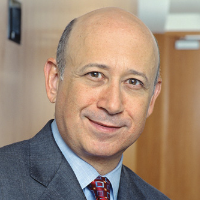Bipartisan Senate Report Warns about Big Banks’ Involvement in Risky Commodities Markets
 Lloyd Blankfein, CEO of Goldman Sachs
Lloyd Blankfein, CEO of Goldman Sachs
After the housing bubble burst, you’d would have hoped that big banks had learned a lesson about risky investments. But now several giant financial institutions have found another way to put their “too big to fail” reputations to the test and legislators have taken notice.
The Senate Permanent Subcommittee on Investigations has issued a lengthy report (pdf) on financial institutions—particularly JPMorgan Chase, Goldman Sachs and Morgan Stanley—that are putting large sums of money into commodities such as aluminum, jet fuel and copper.
“Wall Street’s massive involvement in physical commodities puts our economy, our manufacturers and the integrity of our markets at risk,” subcommittee Chairman Sen. Carl Levin (D-Michigan) said in a release. “It’s time to restore the separation between banking and commerce and to prevent Wall Street from using nonpublic information to profit at the expense of industry and consumers.”
The word “massive” wasn’t an overstatement. According to the report, “Until recently, Morgan Stanley controlled over 55 million barrels of oil storage capacity, 100 oil tankers, and 6,000 miles of pipeline. JPMorgan built a copper inventory that peaked at $2.7 billion, and, at one point, included at least 213,000 metric tons of copper, comprising nearly 60% of the available physical copper on the world’s premier copper trading exchange, the London Metal Exchange (LME). In 2012, Goldman owned 1.5 million metric tons of aluminum worth $3 billion, about 25% of the entire U.S. annual consumption. Goldman also owned warehouses which, in 2014, controlled 85% of the LME aluminum storage business in the United States.”
Commodities markets are inherently risky. Prices can fall and in some cases, such as oil and uranium, the commodities themselves can be dangerous. “Imagine if BP had been a bank,” subcommittee member John McCain (R-Arizona) said, referring to the Deepwater Horizon oil spill. “It could have led to its failure and another round of bailouts.”
Banks are also using insider knowledge to artificially drive up the price of some commodities, particularly aluminum. Goldman Sachs owns Metro Trade Services International, the largest U.S. company certified to store aluminum warranted by the London Metal Exchange for use in settling trades. The company has been accused of moving aluminum in a “merry-go-round” system around its Detroit-area warehouses to manipulate prices. The subcommittee found that the wait to withdraw metal from those warehouses has increased from 40 days to about 600 days. Meanwhile, Goldman has made trades based on the scarcity of the metal.
“We’ve got to get banks out of this kind of business because of the risk to the economy and the possibility of manipulation,” Levin told The New York Times.
-Steve Straehley
To Learn More:
Subcommittee Finds Wall Street Commodities Actions Add Risk to Economy, Businesses, Consumers (Permanent Subcommittee on Investigations)
Wall Street Bank Involvement with Physical Commodities (Permanent Subcommittee on Investigations) (pdf)
Senate Report Finds Goldman and JPMorgan Can Influence Commodities (by Nathaniel Popper and Peter Eavis, New York Times)
- Top Stories
- Unusual News
- Where is the Money Going?
- Controversies
- U.S. and the World
- Appointments and Resignations
- Latest News
- Trump Orders ICE and Border Patrol to Kill More Protestors
- Trump Renames National Football League National Trump League
- Trump to Stop Deportations If…
- Trump Denounces World Series
- What If China Invaded the United States?






Comments